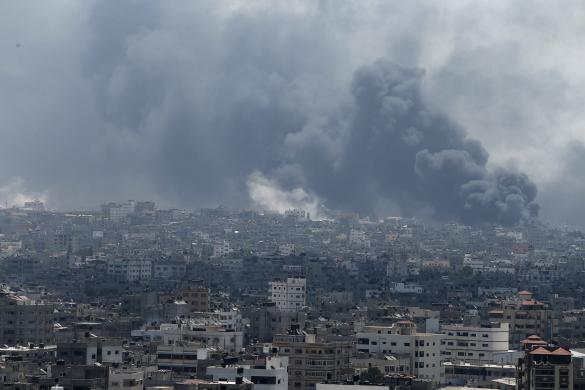Gaza Crisis Update (July 20, 2014)

Smoke rises during what witnesses said were heavy Israeli shelling at the Shejaia neighbourhood in Gaza City July 20, 2014. (Reuters/Mohammed Salem)
- Since July 7, Israel has killed approximately 370 Palestinians in Gaza, and injured approximately 2700 others.
- During the first 48 hours of Israel’s ground invasion, which began on July 17, Israel killed at least 110 Palestinians in Gaza.
- This morning (July 20) local time, the Israeli military killed at least 20 people, including at least three children, in Shejaia in northeast Gaza.
- According to the United Nations, as of July 19 at 8 AM ET:
- At least 228 civilians have been killed, including 77 children and 56 women.
- At least 657 children and 463 women have been injured.
- 60,000 displaced Palestinians are sheltering in 49 United Nations Relief and Works Agency (UNRWA) schools.
- At least 72,000 children require specialized psychosocial support (PSS) due to trauma caused by the death or injury of someone they know or loss of a home.
- 900,000 people suffer from a lack of adequate access to water and sanitation services.
- 80% of the population receives electricity for only 4 hours a day.
- At least 3600 fishermen are unable to make a living and at least 2500 farmers require urgent food assistance due to damage or loss sustained to livestock, agricultural lands, crops and facilities.
- At least 85 schools and 18 health-related facilities damaged since July 7 (three hospitals, twelve clinics and three nursing care centers) require repair. At least one doctor has been killed and at least 19 medical staff injured, and at least four ambulances damaged.
Attacks on civilians
-
On July 19, five civilians, including four members of one family were killed by Israeli shelling in Beit Hanoun in northern Gaza. The dead family were Mahmoud Zuwaid, his wife Daliah, and their children three-year-old Nagham, and two-year-old Ruya.
- On July 18, eight members of the Abu Jrad family, including four children, were killed by an Israeli missile fired into their home in Beit Hanoun in northern Gaza.
- On July 18, four members of the Shaath family were killed and four others injured, including one seriously by an Israeli airstrike on their home in Khan Younis in southern Gaza.
- On July 16, four young boys were killed and three others injured, all cousins, by Israeli shelling on the beach in Gaza City. The dead were Ahed Atef Bakr and Zakariya Ahed Bakr, who were ten-years-old, eleven-year-old Mohammad Ramiz Bakr, and nine-year-old Ismail Mahmoud Bakr, all were cousins.
- On July 13, 18 members of the al-Batsh family, including six children and three women, one of them pregnant, were killed, and 16 others injured by Israel in an unsuccessful attempt to assassinate Gaza’s chief of police by attacking his cousin’s home.
- On July 12, an Israeli airstrike killed two residents of a special needs facility in Beit Lahiya in northern Gaza and seriously wounded several others. The dead were 31-year-old Ola Washahi and 47-year-old Suha Abu Saada, who both suffered from severe mental and physical handicaps.
- On July 10, Israeli forces killed 8 members of the Al Haj family, including five children, during an attack on their home in Khan Younis in southern Gaza.
- On July 9, Israeli forces killed at least 9 civilians and wounded 16 others as they watched the World Cup at a beach cafe in southern Gaza.
Attacks on journalists
-
On July 18, Israel bombed a building containing media offices in Gaza City, injuring a Palestinian photojournalist.
- On July 15, a driver working for The New York Times was slightly injured by an Israeli rocket attack on a house in Gaza City.
- On July 8, Israel bombed a car used by Palestinian journalists, even though it was clearly marked as media, killing the driver and wounding three reporters who were inside.
Statements/reports from human rights organizations
- On July 18, a group of Israeli human rights organizations, including Physicians for Human Rights-Israel, B'Tselem, the Public Committee Against Torture in Israel, and The Association for Civil Rights in Israel, issued a joint press release detailing a number of cases in which wounded Palestinians were unable to access required medical care because of heavy Israeli fire, noting:
“[A]s part of the lessons learned the ‘Cast Lead’ operation, and in accordance with its legal obligations, the military pledged to prepare a coordination mechanism that would allow the evacuation of the wounded and give access to ambulances within a reasonable time. The incidents of last night clearly illustrate that this mechanism, even if it exists on paper, is not sufficiently effective. Accordingly, we urge immediate action to honor this legal obligation to institute a mechanism to regulate the evacuation of the wounded in the Gaza Strip. We call for protection to be provided to rescue teams and medical personnel in the Gaza Strip, to allow them to perform their duties without exposing them to danger. This is to ensure the principle of the sanctity of life and to avoid delays in evacuating the wounded - delays which may be critical and result in more victims.
“Moreover, given the enormous difficulty that civilians face in evacuating areas that are under heavy fire, we request that the parties ensure a safe corridor for citizens seeking to vacate areas under bombardment to save their lives and allow them to move to safe areas.”
- On July 17, the British-based Doctors of the World, which has been working in Gaza for many years, issued a statement entitled “Israeli airstrikes push Palestinian healthcare system to breaking point,” which expressed alarm at the high civilian casualty figures and noted: “Health services have been seriously damaged by airstrikes and have had to endure frequent power cuts.”
